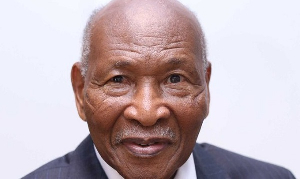- Home - News
- TWI News | TV
- Polls
- Year In Review
- News Archive
- Crime & Punishment
- Politics
- Regional
- Editorial
- Health
- Ghanaians Abroad
- Tabloid
- Africa
- Religion
- Election 2020
- Coronavirus
- News Videos | TV
- Photo Archives
- News Headlines
- Press Release
Business News of Saturday, 30 March 2013
Source: GNA
Gov’t to provide 2,500 jobs for PWDs
Government is arranging with the Ministry of Education to provide permanent employment to 2,500 Persons With Disabilities (PWDs) under the basic school computerisation project.
They will be attached to schools to assist in technical challenges like repairs and teaching while RLG Communications has also agreed to offer employment to an additional 2,500 PWDs.
The out-going Brong-Ahafo Regional Minister, Eric Opoku said this in a speech read for him during a graduation ceremony of 2,100 PWDs from the northern sector.
Participants were from the Ashanti, Brong-Ahafo, Northern, Upper East and Upper West regions who successfully completed six months Information and Communication Technology (ICT) training.
The programme, organized jointly by government through the Ministry of Employment and Labour Relations and the RLG Institute of Technology, forms part of government’s interventions to integrate PWDs into society and make them economically useful and independent.
The RLG Institute of Technology began the first phase of the project to train 5000 PWDs nationwide with ICT knowledge and skills.
The southern sector beneficiaries, comprising 2,500 PWDs from the Greater Accra, Volta, Eastern, Western and Central regions, graduated in September 2012 in Accra.
Each beneficiary was given a certificate and set of tools comprising of magnifying lens, screw drivers, rework station and tweezers to facilitate their own businesses for economic gains.
He said government took a decision that no segment of the population should be left behind in this era of ICT, hence Cabinet gave approval for the rolling out of this initiative.
Mr Opoku therefore urged beneficiaries to keep their tools in shape and putting them into good use for their own benefits and others in their respective communities.
The Executive Secretary of the National Council on Persons with Disability (NCPD), Max Vardon reminded beneficiaries that the training programme was meant to promote and support them for the socio-economic transformation of their lives.
He emphasized that the journey to enhance their lives had started with their graduation where “each of them was expected to take ownership of the challenge of deploying the training and tools they had received for their own survival.










